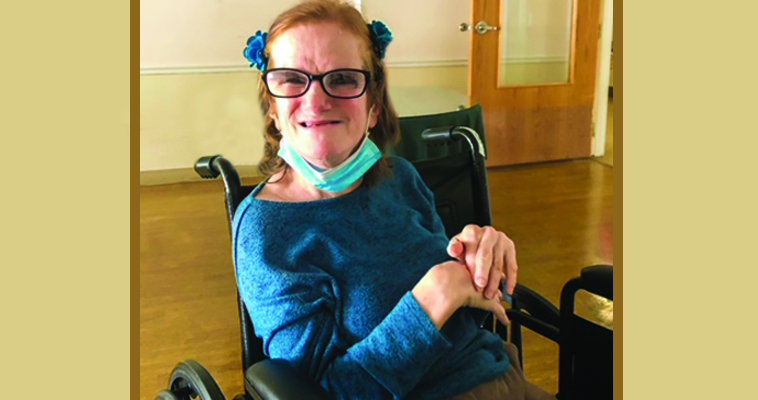As a child, Claire was diagnosed with Cerebral Palsy, a group of disorders that affect movement, muscle tone, balance, and posture. In adulthood, she began working with a social worker through the Department of Developmental Services (DDS) to find an apartment where she could exercise her independence while having a personal care assistant (PCA) during the day. Eventually an apartment was found, and Claire was introduced to a wonderful PCA who became “a part of the family.” At that time Claire used a walker to ambulate and was on her own during the evening hours. This living situation worked wonderfully for years, and Claire was living her life to the fullest while also maximizing her independence.
Years later in 2018, Claire began to get chronic urinary tract infections that routinely resulted in hospitalizations and began taking a toll on her health. The hospitalizations left Claire weaker, and after one particular stay, Claire and her family decided she should go to a skilled nursing facility for rehabilitation. They hoped she would be back in her apartment in a few weeks.
Unfortunately, the nursing facility where Claire was sent neglected her. Her health got increasingly worse, and staff were not making sure her basic needs were met. One day while her sister, Roberta, was visiting, she noticed Claire was more lethargic than usual and “out of it.” She demanded they call an ambulance. Later on, Roberta was told she got Claire out of there just in time. She was severely dehydrated, underweight, and on knocking on death’s door.
After some time recovering in the hospital, Claire was admitted to a different nursing facility that was night and day compared to the last. After regaining her health and receiving physical therapy, Claire was ready to go home. Sadly, timing was not on her side, and COVID-19 had just begun making its way into nursing facilities across the country. Claire was stuck, and because her physical therapy services had ended, she was in bed a lot and lost her ability to walk. Things got even harder when the state would no longer pay for her apartment in the community, and her family was forced to sell it.
During this time, Roberta kept in close contact with Claire’s social worker from DDS. The social worker informed them about the Money Follows the Person (MFP) program. Eventually Claire was assigned an MFP care manager and began the process of transitioning to the community again. Over the next year and a half, despite facing COVID-19 and other challenges, Claire and her family worked with the MFP team to find her housing and a roommate with whom she would share services. She was thrilled at the idea of experiencing a sense of normalcy again.
With the help of MFP, Claire was approved for the rental assistance program that helped her pay for an accessible apartment where she would live with a roommate. The apartment even had access to an accessible pool that Claire can enjoy during the summer. Through MFP she received a new customized wheel chair and many other household goods such as toiletries, bedding, medical supplies/equipment, and groceries. In her new apartment, Claire and her roommate have a 24/7 PCA who helps them with daily living activities and assures that all their needs are met.
Claire still has goals of increasing her independence and getting out of the house more often. These goals are within her reach now that she is living in the community again. Most importantly, Claire is so happy, and her quality of life has greatly improved compared to her time living in a nursing home. She is now looking forward to what the future holds.
Read the CT Money Follows the Person Quarterly Report
MFP Demonstration Background
The Money Follows the Person Rebalancing Demonstration, created by Section 6071 of the Deficit Reduction Act of 2005, supports States’ efforts to “rebalance” their long-term support systems, so that individuals can choose where to live and receive services. One of the major objectives of Money Follows the Person (MFP) is “to increase the use of home and community based, rather than institutional, long-term care services.” MFP supports this by offering grantee States an enhanced Federal Medical Assistance Percentage on qualified services. MFP also offers states the flexibility to provide supplemental services, such as assistive technology and enhanced transition services, to assist in successful transitions. States are then expected to reinvest the savings over the cost of institutional services to rebalance their long-term services and supports for older adults and people with disabilities to a community-based orientation.
Add to Favorites

